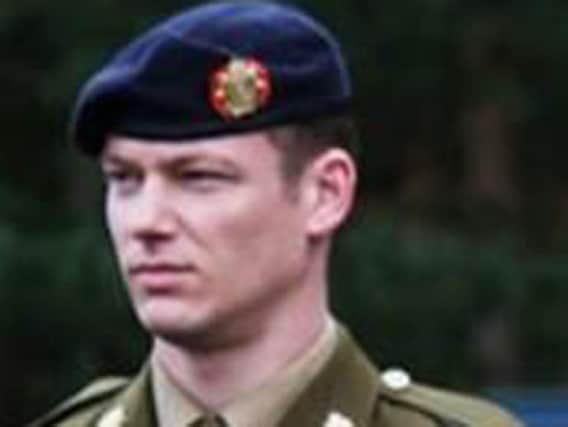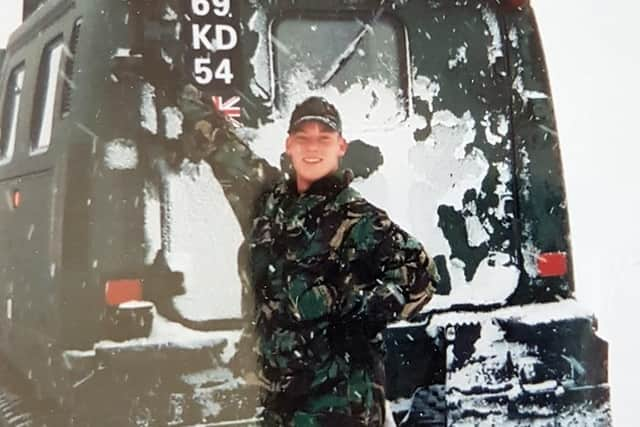After Jason Hardwick left the army, he has struggled with anxiety and loneliness


The darkness is constantly coming in and no matter how hard I try to fight it, it creeps back in even though I desperately don’t want it to.
“Imagine being in the middle of the Atlantic in a dinghy with water filling the boat. You need to bail that water out, but all you have is an egg cup.
Advertisement
Hide AdAdvertisement
Hide Ad“No matter how hard you try to get rid of the water, you can’t as there’s too much water coming in.”


READ THIS: Military suicides: Is there a hidden epidemic?Jason Hardwick uses this analogy to describe his feelings of isolation since being discharged from the Army on medical grounds in 2011 at the age of 30.
Jason, now 39, who lives in St Annes, joined the Royal Logistic Corps at the age of 17 following the family tradition of an army career.
Jason says: “My grandfather, father, an uncle, a cousin and both my brothers were in the Army and I was quite happy to follow in their footsteps and serve Queen and country.”
Advertisement
Hide AdAdvertisement
Hide AdJason served with the 10 Transport Regiment and did his first operational tour of Northern Ireland.
His second tour the following year was the first wave of Kosovo.
Jason was then based with the Allied Command Europe Mobile Force at Aylesbury and spent time in Norway and Turkey and was promoted to Lance Corporal.
He was posted to 921 Bomb Disposal in Germany and responsible for maintaining vehicles and making sure they were roadworthy.
Advertisement
Hide AdAdvertisement
Hide AdHe became second in command of the bomb disposal team for six months in Northern Ireland.
Jason recalls: “I enjoyed army life and liked the other lads and the cameraderie.”
However in May 2003 while Jason was doing a tour in Northern Ireland, he woke up one morning to find he could hardly see and was diagnosed with diabetes.
Jason says: “Within six to 12 months, the diabetes had sorted itself out and settled down to a certain extent.
Advertisement
Hide AdAdvertisement
Hide Ad“However, I was pulled from my number two role as I was not fit for duty.”
Jason says he spent a few years in different roles and started to get disheartened by his lack of career path.
Then in 2011, he was discharged from the army on medical grounds.
Jason remembers: “I was devastated. I had joined the Army and had a brilliant career and then I was hit by the diabetes.
Advertisement
Hide AdAdvertisement
Hide Ad“ I then tried to get myself back on track only to be told they were getting rid of me.”
After leaving the Army, Jason moved to Birmingham and got married. He then began experiencing problems with his diabetes and his marriage broke down.
Jason relocated to Cheshire and remembers it as being a very lonely time.
He explains: “I had no friends and no one to talk to.
“I could not work and was not entitled to any benefits because I had a pension.
Advertisement
Hide AdAdvertisement
Hide Ad“Once my rent and everything else had been paid for, I only had £30 a month to feed myself.
“I became very depressed and would just take myself off walking for the day. I felt I had served almost 15 years for my country and through no fault of my own I had nothing.”
Jason admits things became so bad, he contemplated taking his own life.
He says: “I could not see a way of making my situation better and everyone I had gone to for help had said no.”
Advertisement
Hide AdAdvertisement
Hide AdJason felt incredibly grateful after approaching the Royal British Legion and being given shopping vouchers which allowed him variety in his food.
He says: “It was the break I needed.”
He got married again, but started suffering from depression after the death of three close relatives.
Jason said: “In the space of two-and-a-half years, I lost my step-mum and my father as well as other family members.”
Jason became depressed, anxious, bad-tempered and snappy so hewent to see his GP.
Advertisement
Hide AdAdvertisement
Hide AdHe was referred to what he thought was counselling - but at the end of the session, he was told he would be seen again in a month and discovered he had seen a mental health nurse.
Jason says: “I felt worse after seeing him instead of better.
“ I had laid out my deepest darkest fears and secrets only to be told: ‘See you in a month’.
“I did not see how this was doing me any good so I cancelled the next appointment.”
Advertisement
Hide AdAdvertisement
Hide AdJason does not have PTSD but has severe depression and anxiety.
He says: “I would not attribute 100 per cent of blame to the armed forces.
“But there is a certain amount of blame to be put on the Army’s doorstep. I have felt lost since leaving the Forces.
“I would compare the Army to prison in the way you get institutionalised.
Advertisement
Hide AdAdvertisement
Hide Ad“You are not paid to think - you are paid to do as you are told.
“Then when all of a sudden when tht is no longer there , it is really difficult. I found returning to ‘Civvy Street’ hard as people did not have the same sense of humour or understand you.
“Once you are out of the Army, you feel like no one cares.
“There are lots of charities out there to assist veterans.
“But most veterans feel there is nothing wrong or are too proud to seek help or admit how they are feeling.
“The Government needs to make sure veterans are looked after once they come back from serving their country.”